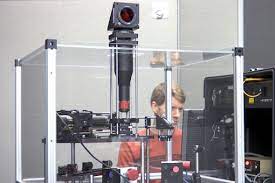Microscopic examination of metals can help airplane manufacturers know that the planes they build can withstand the forces involved in flight and could assure airlines that jet engine maintenance would detect problems before takeoff.
A small woman-owned business based in Albuquerque is commercializing a laser optical technology that has the potential to revolutionize this “failure analysis” procedure — not just for airplane parts but also for prosthetics, wind turbine blades and any product or component made of non-cubic metals such as titanium, magnesium, and zirconium. The technology is also effective on fiber composites and plastics.
Advanced Optical Technologies’ CrystalView crystallographic polarization-classification imaging (CPCI) technology can characterize the strength of metals in a fraction of the time that’s currently required—and can do it in a nondestructive way, without cutting small samples and inserting them in a stationary scanning electron microscope.
Continue reading
